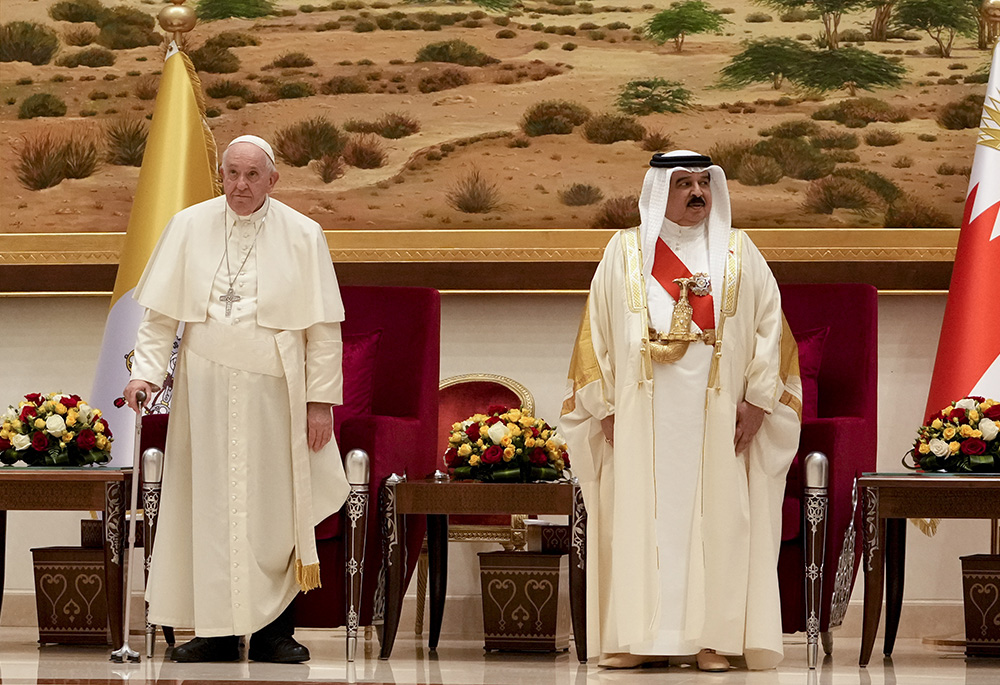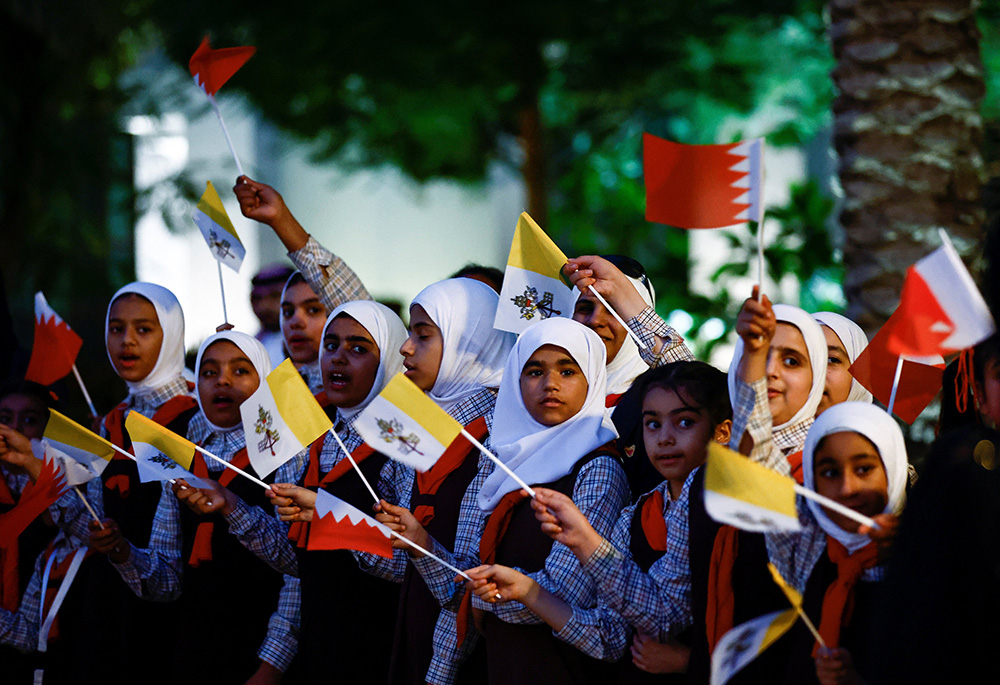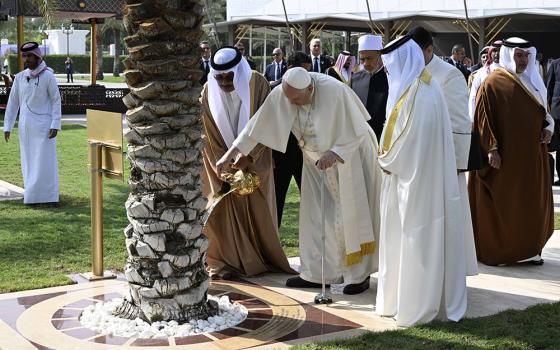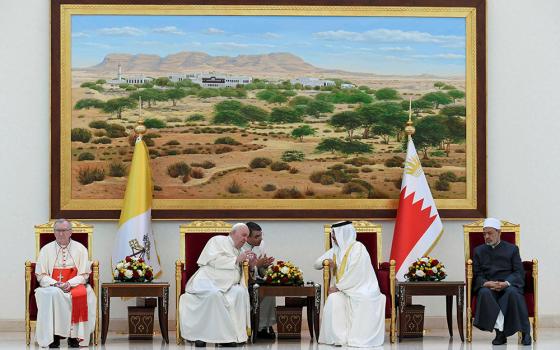
Pope Francis is greeted by Bahrain's King Hamad bin Isa Al Khalifa as he arrives Nov. 3 at the Sakhir Royal Palace, Bahrain. (AP photo/Alessandra Tarantino)
Pope Francis kicked off a four-day visit to the Kingdom of Bahrain on Nov. 3 by appealing to the country to strengthen its commitment to human rights through the abolition of the death penalty and ending religious discrimination.
The Sunni Muslim leaders of the Persian Gulf kingdom have been under fire by leading international human rights organizations, as well as the U.S. State Department, for their treatment of the country's Shiite Muslim-majority population, which makes up some two-thirds of the inhabitants of the tiny nation.
In an address to Bahrain's King Hamad bin Isa Al Khalifa and other government officials, Francis — the first pontiff to ever set foot in the kingdom — cited the country's own constitution, which forbids discrimination on the basis of sex, origin, language, religion or creed.
Such commitments, said the pope, "need constantly to be put into practice, so that religious freedom will be complete and not limited to freedom of worship; that equal dignity and equal opportunities will be concretely recognized for each group and for every individual; that no forms of discrimination exist and that fundamental human rights are not violated but promoted."
In particular, the pope singled out the country's recent reliance on the death penalty. Bahrain's de-facto moratorium on capital punishment ended in 2017. Since then, six people have been executed.
"I think in the first place of the right to life, of the need to guarantee that right always, including for those being punished, whose lives should not be taken," Francis said.
According to a 2021 report, death sentences have skyrocketed over the last decade by over 600%, following the events of the Arab Spring in 2011, which included protests in Bahrain. Since then, the country has been sharply criticized for its violent suppression and imprisonment of Shiite protestors, though the government has repeatedly denied such charges.
Ahead of the pope's arrival in the country, a high-ranking Vatican official told journalists on background that he expects the pope to privately ask the king to free some of the country's political prisoners at some point during the visit.
In a country where nearly half of its 1.8 million inhabitants are migrant workers who have settled in the kingdom from the Middle East, India, Sri Lanka and the Philippines, Bahrain has some of the highest migration levels in the world.

Young people wave flags of the Vatican and Bahrain as they wait for Pope Francis Nov. 3 outside the Sakhir Royal Palace. The pontiff is on a four-day visit to Bahrain. (CNS/Reuters/Yara Nardi)
Francis praised the country for continually welcoming immigrants who have resettled here to pursue greater economic opportunities. But, in a place where human rights organizations have also documented wage theft and health care disparities towards migrants, the pope also warned that all Bahraini residents must be treated with equal dignity and respect.
"Let us guarantee that working conditions everywhere are safe and dignified, that they foster rather than hinder people's cultural and spiritual growth; and that they serve to advance social cohesion, to the benefit of common life and the development of each country," said the pope.
Labor, he said, is "not only necessary for earning a livelihood: it is a right, indispensable for integral self-development and the shaping of a truly humane society."
Advertisement
Francis' primary reason for visiting the country is to take part in the "Bahrain Forum for Dialogue: East and West for Human Coexistence," where on Nov. 4 he will offer a keynote address to some 200 interfaith leaders participating in the summit.
Bahrain, a country whose cities have been built on desert sands with soaring, ultramodern skyscrapers influenced by a range of cultures, Francis said, "has always been a place of encounter between different peoples."
At a time when the world is witnessing "the massive spread of indifference and mutual distrust, the burgeoning of rivalries and conflicts that we had hoped were a thing of the past, and forms of populism, extremism and imperialism that jeopardize the security of all," the pope said it was all the more important for such encounters to take place.
"In spite of progress and so many forms of social and scientific achievements, the cultural disparity between various parts of the world is growing, and destructive attitudes of conflict are preferred to beneficial opportunities for fruitful encounter," Francis said.
The pope's remarks were delivered in the opulent Sakhir Royal Palace, home of Bahrain's King Hamad, who has ruled since 1999. In 2002, Hamad was responsible for implementing a new constitution, which declared the kingdom a constitutional monarchy.
While the pope praised the oil-rich kingdom for its history of being the first in the region to allow women the right to vote in elections and to establish schools for them to attend, he said the work of deepening its commitment to human rights must be kept in focus.
"Authentic, humane and integral development is measured above all," said the pope, by concern shown towards those on the margins, especially migrants and prisoners.
During his nearly 20 minutes of remarks, the pope also spoke about his concern for the wars raging throughout the world, including in nearby Yemen, and the need for greater international cooperation to fight climate change.
"How many trees are cut down, how many ecosystems are devastated, how many seas are polluted by our insatiable human greed, which then comes back to bite us!" the pope lamented.
"Let us work tirelessly in confronting this dramatic emergency and enact concrete and farsighted decisions inspired by concern for coming generations, before it is too late and their future is compromised!" he added, noting that he hopes next week's United Nations Climate Change Conference, known as COP27, in Sharm el-Sheikh, Egypt, helps unite the international community in this regard.
During the 5-hour journey from Rome to Bahrain, the pope made his customary greeting to some 60 journalists traveling with him. The pope said that due to his ongoing knee pain, he would allow journalists to greet him one-by-one as he remained seated, rather than taking his usual walkabout through the plane cabin.
On Nov. 4, following his address to the interfaith leaders, Francis will meet with the Muslim Council of Elders, an international organization, and preside over an ecumenical prayer service at the largest Catholic cathedral in the Persian Gulf.






